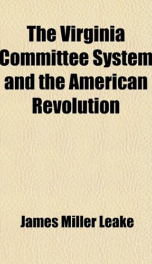the virginia committee system and the american revolution

Purchase of this book includes free trial access to www.million-books.com where you can read more than a million books for free. This is an OCR edition with typos. Excerpt from book: CHAPTER III A Comparative Study Of The Committee Of CorrespondEnce OF 1773 AND THE EARLIER COMMITTEE OF Correspondence Of 1759 On March 12, 1773, the Virginia House of Burgesses appointed a committee of correspondence consisting of the speaker and ten of the leading members of that body. The reasons for the appointment of such a committee are given in the resolutions passed unanimously by the House of Bur-/ gesses sitting as a committee of the whole house upon the( state of the colony.1 The preamble declared that the minds of His Majesty's subjects in the colony had been much disturbed by various rumors and reports of proceedings tending to deprive them of their ancient legal and constitutional rights, and that the affairs of the colony were frequently connected with those of Great Britain and of the neighboring colonies, which rendered a communication of sentiments necessary; in order, therefore, to remove the uneasiness, to quiet the minds of the people, and to serve other good purposes mentioned, it was resolved that a standing committee of correspondence and inquiry should be appointed.2 This committee consisted of the following members: Peyton Randolph, the speaker of the House of Burgesses, Robert Carter Nicholas, the treasurer of the colony, Richard Bland, Richard Henry Lee, Benjamin Harrison, Edmund Pendleton, Patrick Henry, Dudley Digges, Dabney Carr, Archibald Cary, and Thomas Jefferson. Six of these were determined upon as a quorum, and it was stated that the business of the committee should be to "obtain the most early and authentic Intelligence of all such Acts and Resolutions of the British Parliament, or Proceedings of Administration, as may relate to or affect the British Colonies in America; and to keep up and maintain a Correspondence and Communicatio...
Info about the book
Author:
Series:
Unknown
ISBN:
5873350833
Rating:
5/5 (3)Your rating:
0/5
Languge:
English
Users who have this book
Users who want this book
What readers are saying
What do you think? Write your own comment on this book!
write a commentif you like the virginia committee system and the american revolution try:
Other books by this author
Do you want to read a book that interests you? It’s EASY!
Create an account and send a request for reading to other users on the Webpage of the book!


